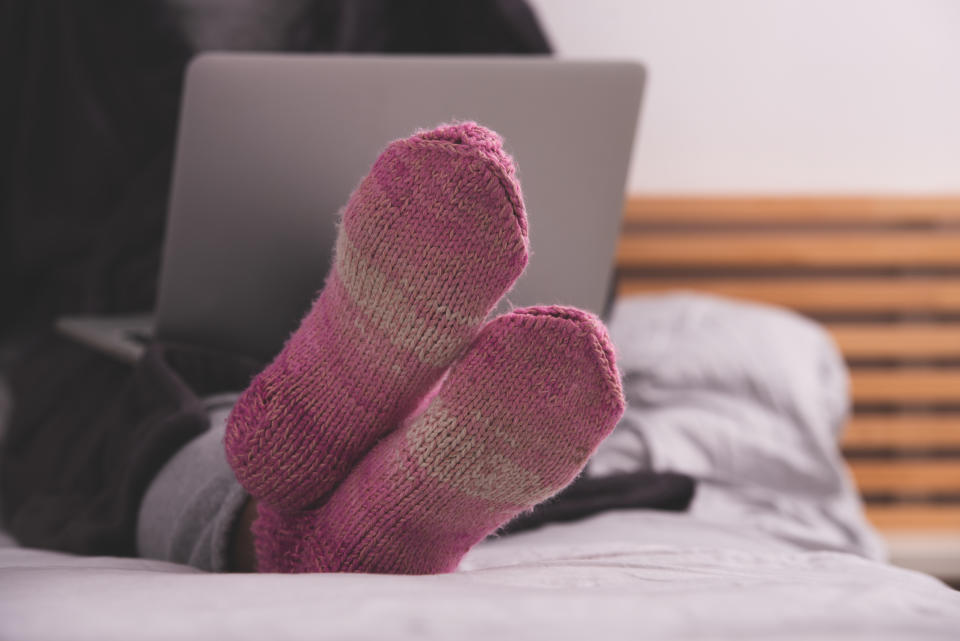Here's why you shouldn't work from your bed during the coronavirus pandemic

When we think about working from home, a certain image comes to mind of typing away in our pyjamas with the TV on in the background and sending emails while lounging on the sofa. For some, working from home means staying in bed all day - which is particularly tempting on a cold, rainy day.
When we are all self-isolating and social distancing and things seem bleak, clacking away on your laptop while propped up with pillows is far more enticing than being sat at your kitchen table. But is it really a habit we should be getting into?
From time to time, working from your bed is fine. There are obviously exceptional circumstances, such as being unwell - although you probably shouldn’t be working at all.
But research shows that frequently working from your bedroom can have a negative impact on your work, productivity and your sleep.
One of the key problems is that we create mental associations between what we are doing, what we should be doing and our location. This means that if you are working from bed, it can become far more difficult to switch off from work and get some rest at night because your brain will think you are in a place of work.
Read more: Five apps that can help you work from home
Although it can be difficult if you are living in a studio flat or a houseshare, it’s therefore important to try and keep the areas where you work and unwind as separate as possible.
“Avoid stressful, stimulating activities - doing work, discussing emotional issues,” the Division of Sleep Medicine at Harvard advises. “Physically and psychologically stressful activities can cause the body to secrete the stress hormone cortisol, which is associated with increasing alertness. If you tend to take your problems to bed, try writing them down - and then putting them aside.”
When you work before going to sleep, even just to send an quick email, the act of looking at a bright screen also impacts your sleep. Specifically, it is short-wavelength blue light from the screens we watch that keeps us awake, a 2017 study by the University of Haifa found. Not only does it damage the duration of our sleep, but the quality too.
The blue light emitted by screens on cell phones, computers, tablets, and televisions restrain the production of melatonin, the hormone that controls your sleep/wake cycle or circadian rhythm. Reducing melatonin makes it harder to fall and stay asleep, so if you can, it is better to make your bedroom a technology-free zone.
Read more: How to avoid cabin fever when you work from home
And when we sleep badly, it affects our productivity and the quality of our work too. One bad night is unlikely to impact your work, but research has shown that trouble sleeping in the long-term can affect work attendance and performance. Lack of sleep affects your mood, your judgment, and your ability to focus, which can lead to errors or poor decision making.
A study published in the journal Sleep in 2018 found that insomnia was the sleep problem that had the greatest impact on work productivity. Analysing data from more than 1,000 adults in the US, researchers found those with moderate-severe insomnia experienced more than double the productivity loss - 107% more - compared to someone without insomnia.
Although you would think working from bed would be comfortable, it can lead to all sorts of aches and pains, particularly in your back and neck. Being hunched over all day isn’t going to do much for your posture.
Finally, doing everything from your bed is also pretty unhygienic. A study by Amerisleep examined the microscopic parts of our mattresses and bedding via a study with volunteers who swabbed their sheets over a period of four weeks without washing them. The results found pillowcases contained 39 times more bacteria than pet food bowls at the end of the testing period.
Read more: How to stop your social media habits jeopardising your new job
It’s not always easy to keep your working area separate from where you eat and relax, particularly when you are confined to your house or if you live in a small apartment. But even keeping a small workspace set up in the corner - perhaps hidden behind a screen - can help create the illusion of a dedicated office area. And if you must work from bed, shut down your laptop well before you want to go to sleep - and remember to wash your sheets.

 Yahoo Finance
Yahoo Finance 